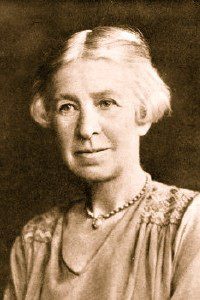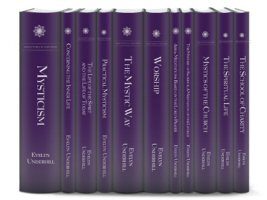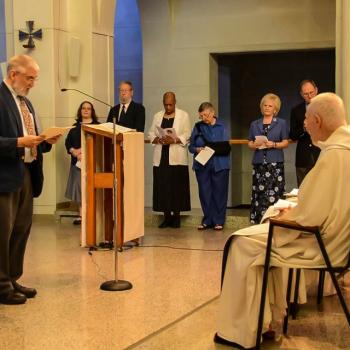
December 6 is Evelyn Underhill’s birthday, born this day in 1875.
Not only did she go on to become one of the most important Christian mystics of the 20th century, but she also influenced a number of key figures who came after her, including C. S. Lewis and Thomas Merton. A Trappist monk once told me that her book Mysticism was required reading when he was a novice monk in the 1950s.
A remember talking to a seminary dean, probably 30 years ago now, and telling him I was interested in mysticism. Since I didn’t specify “Christian mysticism,” he asked me a question to clarify where I was coming from. “Are you talking about Shirley MacLaine-style mysticism, or Evelyn Underhill-style mysticism?” That’s how much of a key figure Underhill has been in terms of promoting Christian mysticism for our time.
Underhill was the first woman to lecture on religion at Oxford University. She was a leader in promoting retreats as a spiritual practice for laypeople in her time. Indeed, one of the Archbishops of Canterbury said that Evelyn Underhill was the most important figure in Anglican spirituality between the two world wars.
She died in June 1941 after suffering a stroke. She left behind an impressive literary legacy, including Mysticism, Practical Mysticism, Mystics of the Church, and Worship. Her letters are also really important — they’re available in several different editions — in that they reveal her gifts as a spiritual director.

She was a lifelong member of the Church of England, but seriously considered converting to Catholicism and retained a strong catholic sensibility even when she chose to remain an Anglican. For many years she had a Catholic spiritual director, Friedrich von Hügel, himself a noted authority on mysticism.
Indeed it was von Hügel that insisted if Underhill was not going to become a Catholic, she should at least be committed to practicing her faith as an Anglican.
Mysticism for Us Normal Folks
Along with Catholic writers like Karl Rahner and Thomas Merton, Underhill was a key voice in promoting Christian mysticism as a “normal” spiritual path for all the baptized. In this way she anticipated Vatican II’s proclamation of the universal call to holiness. We may not all be mystics in the same way, but we are all called to be mystics in some form or fashion. And Underhill’s books do much to show the way.

Long-time readers of this blog know that I am particularly fond of a Catholic Bible-study program called Verbum. Verbum is a sister program to Logos, one of the premiere Bible-study platforms for Christianity as a whole. Among other things, Logos publishes a number of Anglican resources, including a collection called The Mystical Works of Evelyn Underhill.
This collection gathers together eleven volumes of Underhill’s books: Mysticism, The Mystic Way, Practical Mysticism, The Life of the Spirit and the Life of Today, Mystics of the Church, Concerning the Inner Life, The School of Charity, Worship, The Spiritual Life, and two books of meditations, The Mystery of Sacrifice and Abba.
Most of these books are available as e-books elsewhere — but like many other authors whose work is now in the public domain, Kindle and other ebook versions of Underhill’s writings are often poorly produced editions with mediocre formatting.
The Verbum collection of Underhill’s writings, by contrast, are meticulously edited and hyperlinked, especially in terms of scripture passages and quotations from other key sources, like Augustine, Aquinas or Plato. Imagine Reading Underhill, and you come to a footnote where she quotes from the Bible (in Latin, often as not), and with one click you’re reading the text she’s citing in its original context? That’s what the Verbum edition offers. And while not every source she cites is hyperlinked that way, enough are to make this collection of her writings the one electronic edition I heartily recommend.

Of course, to use The Mystical Works of Evelyn Underhill you will need Verbum (or Logos), which is an investment — but Verbum reminds the user that Christian study always happens in a communal and contextual way. In other words, with Verbum you will not only read Evelyn Underhill, but first and foremost you will have access to 2000 years of scripture study and commentary, which means that when you read the Bible — or other great authors, like Augustine and Aquinas, Bernard of Clairvaux, all the way down to contemporary scholars like Raymond E. Brown — you are reading it with the wisdom of the entire Christian tradition at your fingertips.
Back to Underhill — I think we need to remember when we read any of the mystics, to read them with an eye to the tradition in which their wisdom stands. It’s been said that the entire history of western philosophy could be viewed as simply so many footnotes to the writings of Plato. Likewise, all the writings of all the great mystics are simply footnotes to Sacred Scripture. I think students of Christian mysticism often lose sight of that essential fact.
Evelyn Underhill’s writings literally changed my life. If you’re not familiar with her books, do yourself a favor and get your hands on some of them. Start with Practical Mysticism and then move on the Mysticism. And keep reading from there. She will invite you deeper into the love of God. And what could be better than that?
Note: if you are new to Verbum, visit this page to learn more about it — and to get a special discount coupon code to save 10% off your Verbum library purchase, exclusively for readers of this blog!
Enjoy reading this blog?
Click here to become a patron.
Stay in touch! Connect with Carl McColman on Facebook:














